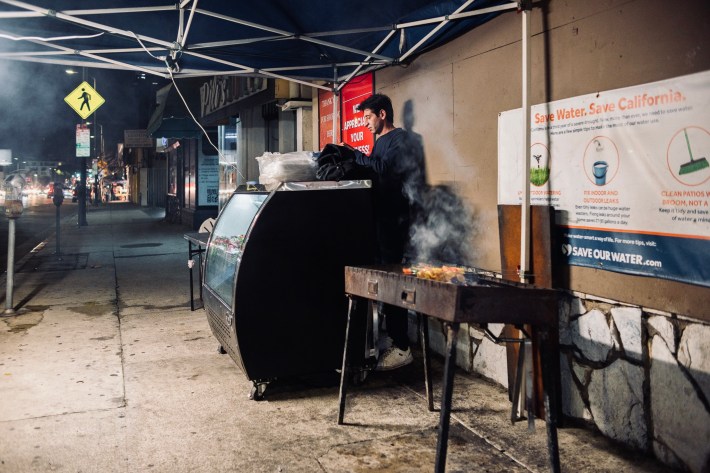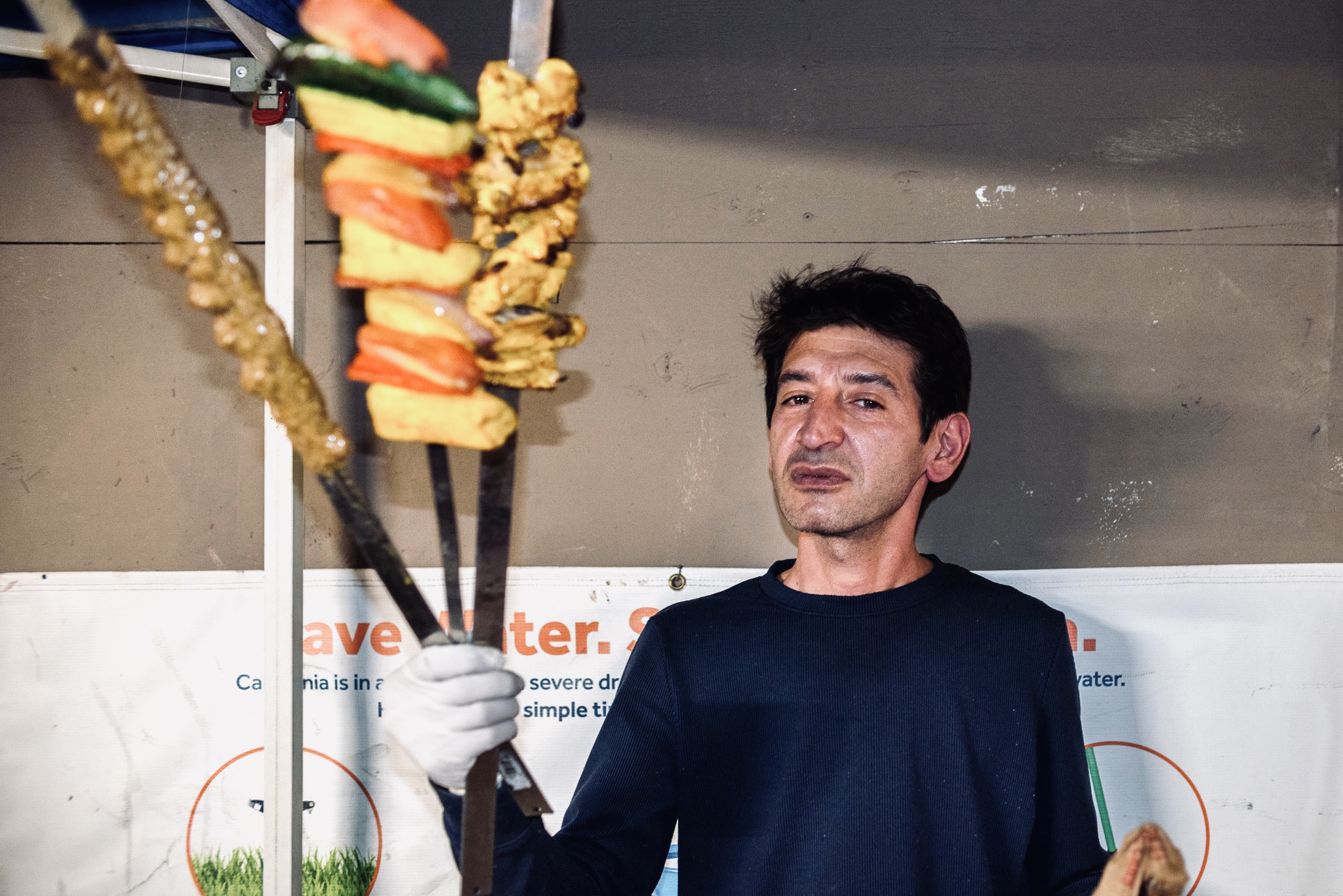We’ve seen some crazy things in 20 years of covering street food in Los Angeles. Still, nothing had yet prepared us for the sight of a fluorescent-lit refrigerator display case glowing through the dark on the sidewalk in front of Brockton Liquors in West L.A.’s Sawtelle neighborhood.
What exactly might be going on here, we had to ask. A streetside sushi omakase? Some kind of sidewalk butcher? The lack of any signage only deepened the mystery.
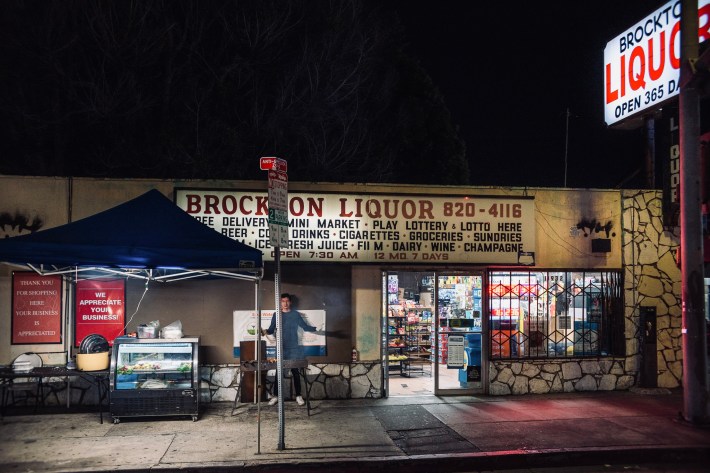
Our curiosity irreversibly piqued, we flipped a proverbial bitch to find a lean man building a charcoal fire, his fridge filled with steel-impaled kebabs of steak, lamb, chicken, and the hand-shaped, Persian minced meat skewers known as koobideh.
Introducing ourselves, we tripped out to hear this kebab chef tell us his name was “Jose,” which made some certain sense on this stretch of Santa Monica Boulevard, east of Bundy, where the food truck and street food vendor scene has snowballed of late, in part due to its concentration of Oaxacan families.
“Hossein,” he would later clarify, after we called him “Jose” a sufficiently problematic number of times. “As in Barack Hussein Obama.”
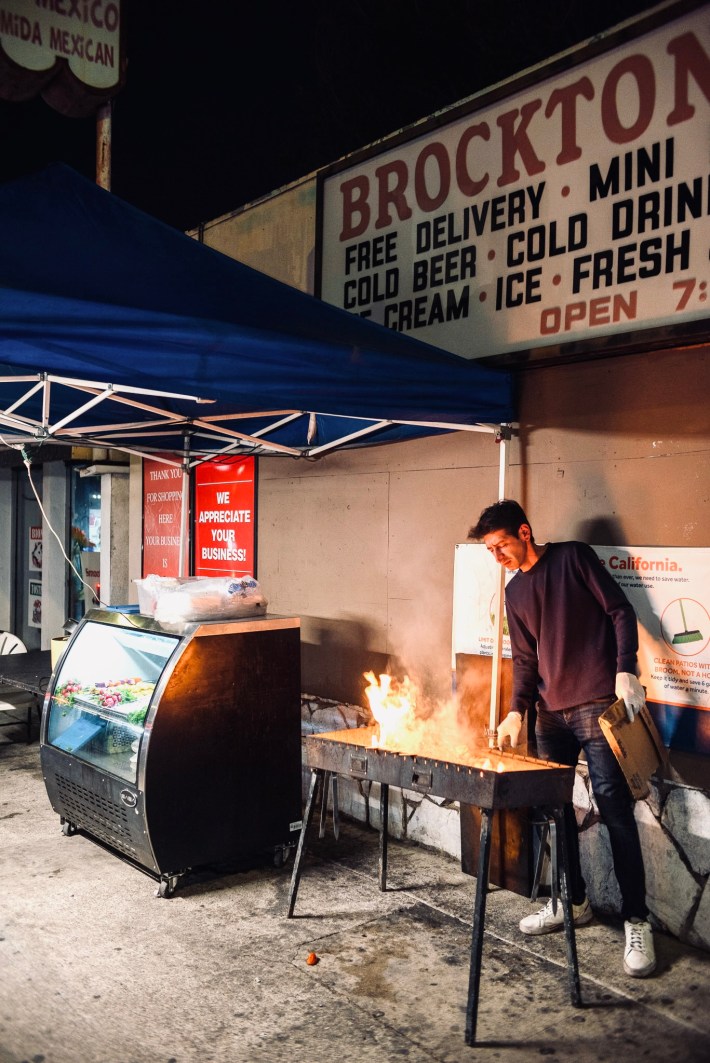
Hossein Akbar arrived in the United States in 2017, as a refugee from Urmia, an Azeri-majority city in the West Azerbaijan Province of Iran built on a vast plain that has likely been occupied by people since 2,000 years before the birth of Jesus Christ; probably even 6,000 years, according to stone age settlements excavated there.
Stuffed into the northwest of Iran, the oft-contested, eternally-battled-over region is bordered by Turkey, Iraq, Azerbaijan, and Kurdistan and does not escape the repression of Iran’s theocratic regime.
Akbar’s father was a chef and owner of his own restaurant in Urmia as Hossein was growing up. The son started his own career in kitchens at age 17. He spent 30 years cooking Persian and Turkish cuisine himself and at one time owned his own restaurant.
The dream of having his own place drives him again in the U.S. A dream that was unfortunately forced back on the shelf recently by an on-the-job injury and following surgery that makes it impossible for him to work in a kitchen right now. However, the 47-year-old is attending school and looking forward to the day he’ll return.
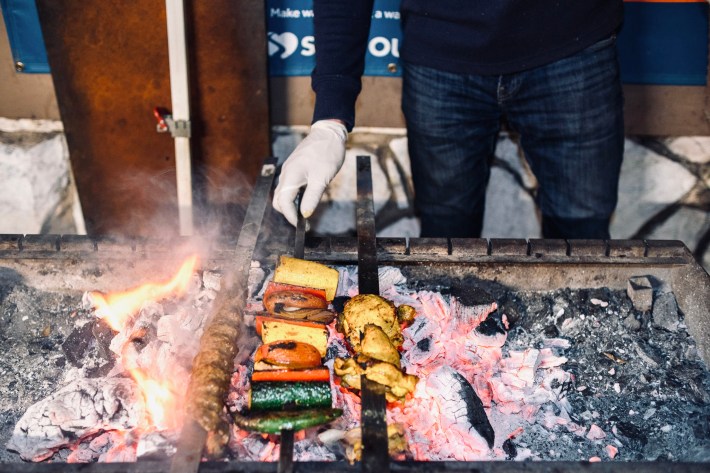
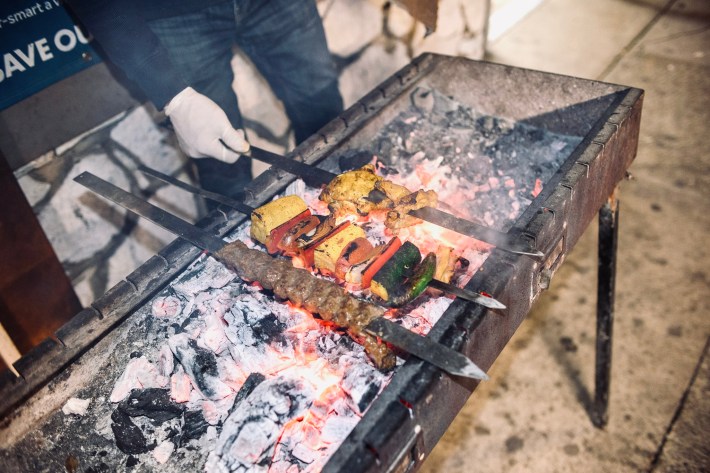
Now Akbar is doing what he has to to survive in a Los Angeles that increasingly makes life accessible only for its most monied residents. Now he’s cooking seven days a week from 5 to 10 PM on the corner in front of Brockton Liquors, run by a supportive friend. Under the name Ayhan Catering, he also offers Persian and Turkish cuisine to your private affairs.
Like so many street vendors in our city who are cooking traditional food from their countries to afford another day of the American dream, Akbar is out here in the elements, making and grilling kebabs for survival.
But that doesn’t mean there’s a thing about his approach that is phoned in or diluted. He takes his ingredient sourcing to a level that could make the team at Erewhon blush.
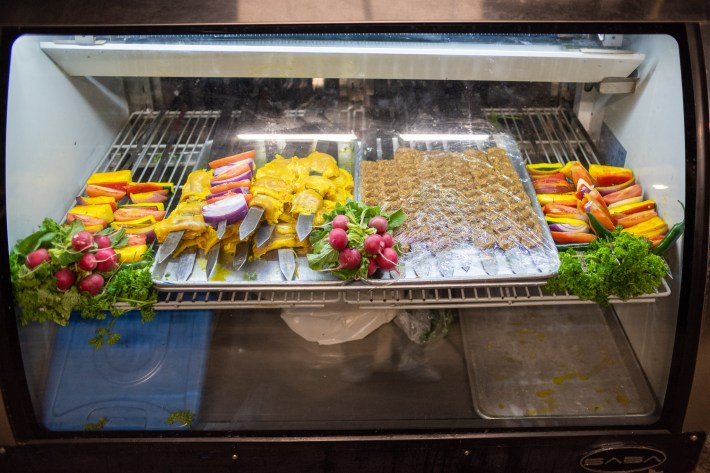
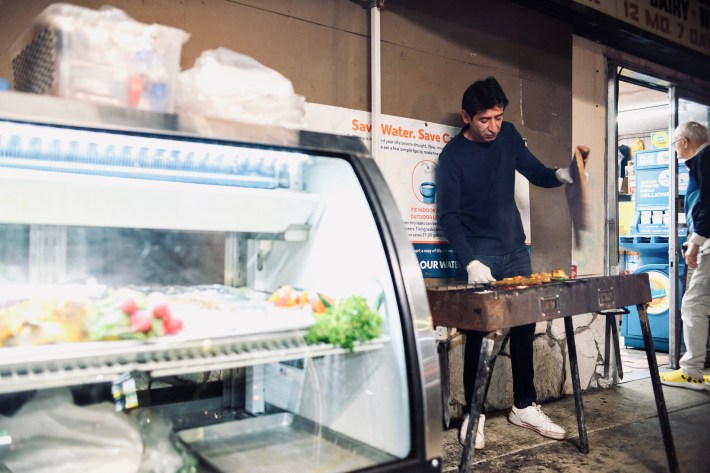
Which is where the boxy, black fridge squatting beside him like a droid on nightwatch comes in. Hossein only buys organic Halal meats, long-grain basmati rice, and vegetables for his kebabs, salads, and sides, at an expense that does nothing to boost his bottom line. The fridge keeps his skewers, whether they bear steak, chicken, shrimp, bell peppers, onion, or tomato, fresh until the moment they’re grilled.
He does all the prep of marinading and skewering the meats, including a masterfully shaped koobideh. If one was in the West L.A. kebab game for the money alone, they might rely on something premade from the two Kosher Persian markets nearby.
After hauling that out of the liquor store and setting up his rice cooker and mangal grill, the street chef builds a small mountain of jet-black lump charcoal and sets it aflame, crushing the embers into a glowing bed of red, white, and orange coals. Smoke pours all over the block, meeting and mingling with the aromas of sizzling tlayudas and quesadillas from Taquería Carrasco on the other corner.
“This is original kebab,” he told L.A. TACO the next night we caught up with him. “Persian restaurants, they don’t have Persian chefs. They don’t know original kebab. They make kebab, but not original kebab.”
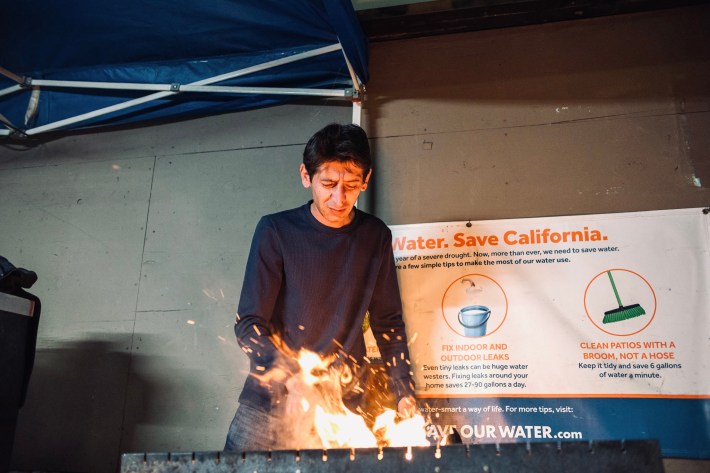
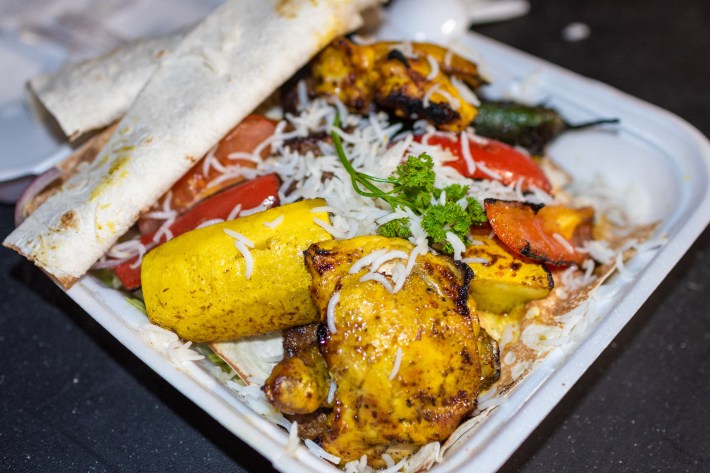
Cross-hatching long lengths of koobideh and pudgy, yellow, char-scarred chicken legs and thighs on top of a bedrock of basmati rice and a vinaigrette-spiked salad, Hossein blankets every order with a few sheets of lavash from Markook, described as the “thinnest flatbreads” by Ara-Z Breadmasters, the Commerce-based bakery that makes them.
His chicken, marinaded with red pepper, olive oil, onion, and salt, is juicy, hot, and tender, with the flavors of pure poultry and slight smoke at the forefront. The koobideh is characteristically supple, its handcrafted circuitry of angles revealing random hints of black pepper, sweet onion, and spices like coriander, turmeric, and cumin through its thoroughly beefy bass notes.
Bringing your food home, you’ll likely find corners of the lavash and much of the rice have been saturated in meat juices, a sort of Persian takeout version of the flavor distribution chemistry tapped in tacos canasta or Dino's Famous Chicken.
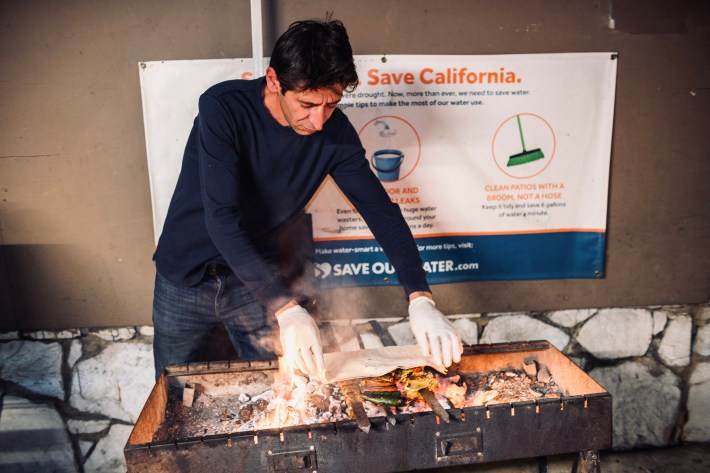
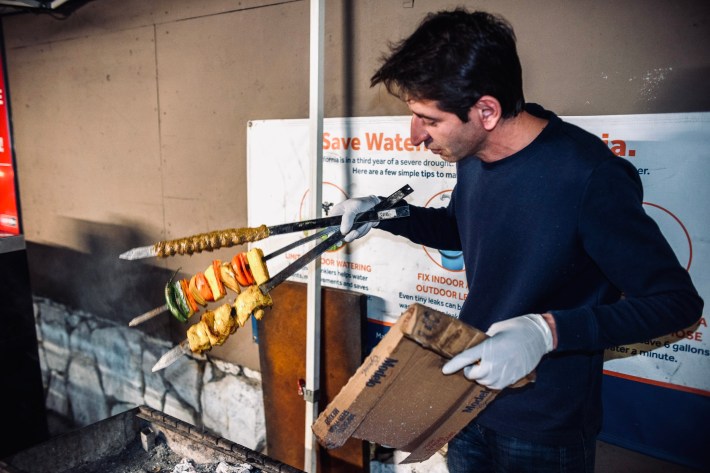
Tearing off bits of the flatbread, you can roll your own combinations of basmati, meat, vegetables, and salad, playing with the sensations of acidity, umami, and sweetness they all lend to the whole. If you want to set it all on fire, a very spicy jalapeno comes on the side.
These are superb kebabs, forged with just enough lick of flame and charcoal from a chef who has the confidence to keep his food straightforward, traditional, and driven by the best ingredients he can find.
On a recent visit, Akbar told us he’d been forced to stop serving the steak, shrimp, and lamb to focus on vegetables, koobideh, and chicken kebab. He said that if he cannot sell those higher-priced meats on any given night, he’s stuck with the product, losing money. He still offers them in his catering business, however.
“I would like to have a restaurant,” he said. “But I need money. If I had a small place, I could offer 100 kinds of kebabs, with trout and salmon. I know how to do this. But I can’t make all items on the street.”
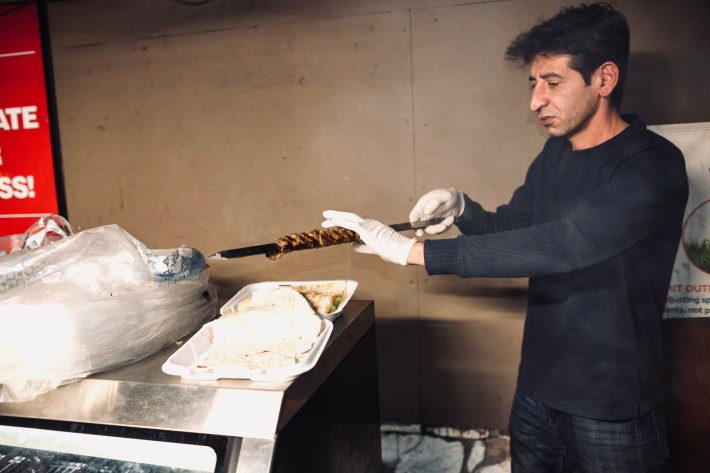
Akbar’s Persian kebabs are far from the only ones you’ll find on L.A.’s westside, where Iranian eateries cluster. His set-up is bookended by notable koobideh-slingers such as Darya, Javan, Naan Hut, and Flame International, not to mention the dozen or so more in neighboring Westwood.
The difference here, of course, is the incomparable taste endowed by his charcoal grill (as opposed to the gas grills used indoors) and the ability for customers to see everything picked and cooked in front of them as he works individually on every order.
Nearby, you’ll find charcoal-grilled kebabs at Santa Monica’s Tehran Market and Sawtelle’s Santa Monica Kosher Market, but only on weekends. Akbar is currently in front of Brockton Liquors every night, save for these recent rainy ones when he’s given no choice but to keep his fire quiet.
He is just one food vendor in a growing sea of shawarma, kebab, manti, k'nafeh, wraps, and doner that one is likely to find on L.A.’s sidewalks or sold from boxy trucks and small cafe spaces, or found at catered celebrations, as staples from Turkey, Armenia, Egypt, Iran, Afghanistan, Georgia, and cultures beyond and between continue to mushroom throughout Southern California, driven by their owners' dreams and determination to thrive.
Ayhan Catering ~ 5-10 PM daily, at Brockton Liquor, 11932 Santa Monica Blvd. Los Angeles, CA 90025. Closest transit lines and stop: Metro Bus Line 4, Santa Monica Big Blue Bus Lines 1 and 14 - "Santa Monica/Bundy."
